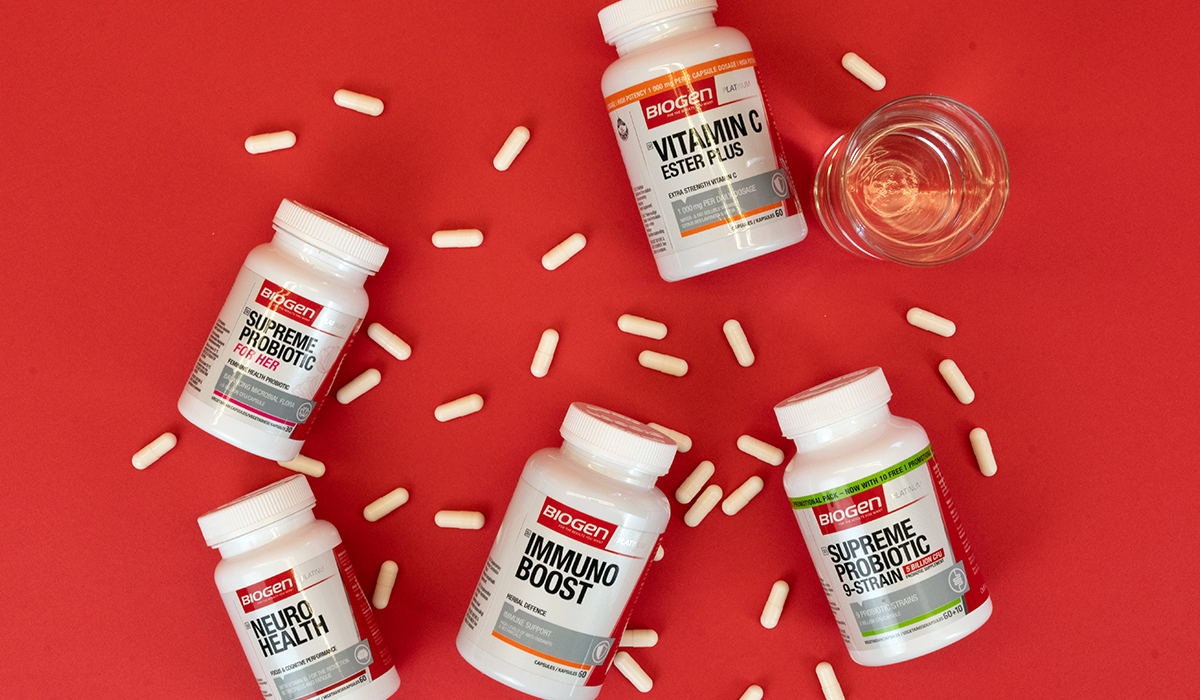
If you are eager to maximise the effectiveness of the vitamins and minerals from the Biogen Platinum range that you take every day, then it’s time to consider supplement timing to achieve the best results!
Incorporating quality vitamin and mineral supplements into your daily diet can offer a beneficial way to fill nutritional gaps in your diet, bolster your immune system, support recovery, and enhance overall health and well-being.
Think More Strategically
However, a haphazard approach to supplement consumption might not yield the full return on your investment, as not all vitamins are created equal.
Some vitamins require water for absorption, while others need a source of dietary fat. Certain vitamins work best when taken in combination with others while a few can hinder the absorption of specific substances.
With these factors in mind, strategically timing when you take your vitamin and mineral supplements throughout the day can optimise their absorption and effectiveness.
Timing Your Supplement Intake
While the concept of supplement timing may initially seem complex, it becomes straightforward when you understand how your body processes and absorbs nutrients.
The primary considerations for taking supplements involve the time of day and whether you should ingest them with or without meals.
Preventing Digestive Discomfort
In general, most supplement labels recommend taking vitamins and minerals in the morning, either with or immediately following your first meal.
The primary reason for this recommendation is to avoid potential digestive issues that can arise when consuming concentrated vitamin or mineral supplements on an empty stomach. Symptoms such as stomach cramps, heartburn, acid reflux, nausea, or diarrhea can occur, particularly with larger doses.
Magnesium, for instance, is known for its possible laxative effects, which is why healthcare practitioners typically advise taking it with a meal.
Enhancing Absorption with Dietary Fats
Taking certain supplements with food can also improve digestion and enhance the body’s absorption of nutrients, particularly for fat-soluble vitamins. This principle applies to any multivitamin containing these vitamins.
Fat soluble vitamins include:
For instance, if you’re taking these vitamins, having them with breakfast alongside some avocado or nut butter on your toast can offer absorption benefits.
Considering Solubility
If you’re taking multiple supplements, you can split your doses and take the second batch with lunch. However, it’s recommended to consume energy- or metabolism-boosting supplements like B vitamins in the morning.
B vitamins (along with vitamin C) are water-soluble, so taking water- and fat-soluble vitamins separately may improve absorption rates. To enhance absorption, start your day with a glass of water (or lemon water with a pinch of salt) and take your vitamin B and C supplements either before or shortly after breakfast.
Exceptions: Chelated Mineral Supplements and Probiotics
You can take some products on an empty stomach, notably chelated mineral supplements. Chelation occurs when a mineral binds to an acid, eliminating the need for stomach acid to break it down. Magnesium Chelate is an examples of such a product.
As for Probiotics, preliminary research suggests that taking them with or 30 minutes before a meal may yield better results than taking them after eating.
The Dinner Dilemma
Consuming vitamin and mineral supplements with or after dinner is often a subject of debate. While some argue that evening supplementation can provide added nutritional benefits during sleep, it’s essential to consider that digestion tends to slow at night, potentially hindering absorption.
There may be exceptions, though, like natural hormone-boosting supplements such as ZMA, which could offer better benefits when taken both in the morning and evening. A study published in the Journal of Exercise Physiology in 2000 found improved anabolic hormone profiles and muscle function with ZMA supplementation.
Leveraging Synergy and Avoiding Interference
Consider potential synergies between specific nutrients. For example, Vitamin D enhances calcium absorption while Vitamin C boosts iron absorption. Combining these nutrients at the right times could maximise their benefits.
However, it is important to note that certain combinations can hinder absorption. Calcium, for instance, can affect the absorption of iron, zinc, and magnesium. Therefore, taking calcium supplements (alongside vitamin D) at different times than iron supplements or multivitamins may prove beneficial.
Divide Your Doses
Remember that your body can only absorb a certain amount of a specific nutrient at one time. Practical recommendations suggest dividing your doses throughout the day rather than taking a single dose in the morning and/or evening.
Incorporating these timing strategies into your supplement routine can help you get the most out of your vitamins, minerals, and supplements, promoting optimal absorption and overall well-being.










